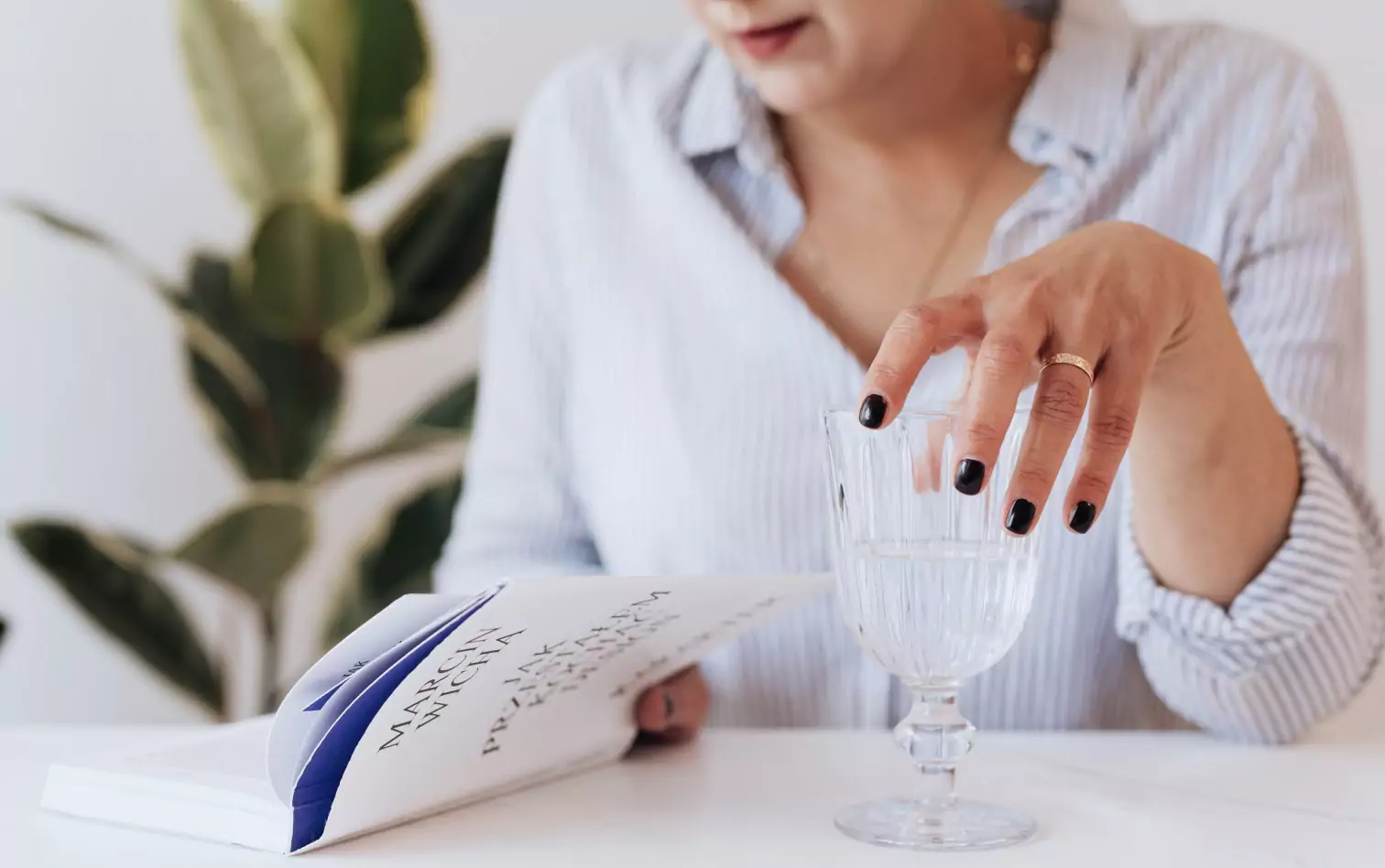What Causes Excessive Thirst (Polydipsia) [+5 Tips to Help]

Key Takeaways
When you are thirsty, your body tells you that it needs more water. But what about when you're thirsty all the time, even when you're drinking enough water every day? If nothing seems to quench your thirst, you may have an excessive thirst issue. No, we're not kidding! The medical term for thirst, or extreme thirst, is polydipsia. Polydipsia can cause excessive thirst, leading people to drink more water than necessary, and in turn to other issues like frequent urination.
There are two types of polydipsia: primary and secondary. Primary polydipsia (overhydration) means you drink more water than your body requires or is intended to have. Secondary polydipsia is thirst caused by disease or drug treatments necessitated by a genuine need for water.
Polydipsia can last for multiple days, weeks, even months! The duration will depend on its cause. Feeling like you have a dry mouth even after drinking an adequate amount of water is often one of the leading symptoms of polydipsia.
But, what causes this excessive thirst? There are many different reasons, and we're going to discuss a few in this article. While none of this is intended as medical advice, it's a good idea to know as much as possible about different things that can affect your health. So, if you feel like you've been drinking enough water and still can't quench your thirst, here's what you should look out for. If you have a range of these symptoms and feel thirsty all the time, it's best to schedule an appointment with your doctor:
Causes of Frequent or Chronic Excessive Thirst

Certain Medications
Certain medications may cause you to develop polydipsia as a side effect. Here's what you should know about this:
- Certain medicines, like diuretics, corticosteroids, anti-psychotics, and vitamin K, can lead to polydipsia.
- If you think you're experiencing symptoms due to a medication you have been prescribed, speak with your doctor as soon as possible to discuss other options.
Dehydration

One of the most common causes of thirst is dehydration. When dehydrated, your body does not have enough water to function correctly. Dehydration can be caused by many things, including vomiting, diarrhea, exercise without proper hydration, and excessive sweating.
- Although the amount of water you should drink daily varies from source to source, it's important to discover what the right amount is for you. The National Academy of Medicine suggests an estimate of 72-104 oz of water per day. Your needs might be different, so work with a professional if you need personalized recommendations! Your daily water requirement will depend on your body's needs, the climate you live in, and your activity levels.
- Get a large water bottle, one or two liters, so that you can see how much water you're drinking every day.
- If you're sick, have diarrhea, or are vomiting and feel like you can't drink or hold down water, call your doctor as you may be at risk of dehydration.
Organ Failure (Heart, Kidney, Liver)
Heart, kidney, and liver failure may lead to polydipsia. This is usually because your body can no longer transfer enough fluid from your bloodstream to your tissues.
- This is a severe medical issue, and treatment will need to be handled by your doctor once you have a diagnosis.
Sepsis
Sepsis is a reaction in your body resulting from a severe infection. Sepsis can lead to organ failure, tissue damage and is sometimes fatal if not treated promptly.
- A common side effect of sepsis is polydipsia.
Different Types of Diabetes (Mellitus, Insipidus)

Two different types of diabetes may result in polydipsia. When your blood sugar rises, it may result in an increase in urination. If you urinate too much, you may become dehydrated and drink more water than you need to.
- Diabetes Mellitus develops when your body doesn't produce enough insulin or respond appropriately to insulin. This then causes blood sugar levels to become abnormally high. Your kidneys will attempt to remove the excess glucose by passing it through your urine. This will increase thirst levels as well as the frequency with which you urinate.
- Diabetes Insipidus is a rare form of diabetes that can cause an imbalance of the fluids in your body. It may lead you to produce more urine than usual (or that someone who is 'healthy' normally would). This can lead to constant feelings of thirst. To give you a better idea, a healthy person will pass approximately three quarts of urine in a day. Someone suffering from diabetes insipidus may pass up to 20 quarts of urine daily.
Other Common Causes
Apart from what we’ve already mentioned, there are some other things that can affect hydration levels. Here are a few other common causes of polydipsia you should know about:
- Eating foods that are high in salt or added sugars.
- Exercising without properly hydrating.
- Diarrhea and vomiting.
- Getting sunburned or severely burned on your body
- Losing significant amounts of blood.
- Spending time in a drier climate than average (like the desert or high altitudes).
- Mental illnesses like schizophrenia, depression, anorexia, and anxiety.
What's The Link Between Blood Sugar and Thirst

High blood sugar levels can lead to excessive urination. When your body produces too much urine, it often passes water that your body needs. If you feel as though you're feeling thirsty more than usual and urinating too often, you may want to check your blood sugar levels.
You can do this with an at-home blood glucose test (the finger prick) or by wearing a CGM.
If your blood sugar levels are consistently high, it's a good idea to speak with your doctor. They may recommend medication, dietary changes or suggest working with a dietitian.
Drinking the Right Amount of Water (Fluid) Each Day

There is no one size fits all when it comes to water intake. A good place to start is by making sure that you are drinking 72-104 oz of water per day. If you are active, pregnant or breastfeeding, or live in a dry climate or high altitude your needs may be greater. Environmental and health conditions will factor into your body’s needs, so if you aren’t feeling like you understand your body’s needs, speak with your doctor or a registered dietician to ensure that you are staying hydrated.
Remember that there can be too much of a good thing! Drinking too much water can be harmful to your health. When you drink too much water, your blood gets diluted. If your sense of thirst is working as it usually would, you can urinate to get rid of excess water and stop drinking it when you know you have had enough. However, with polydipsia, this can lead to a depletion of sodium and sugar levels in your blood.
To determine how much water you need, factor in the environment you live in, your health, medications, weight, and height. You should also consider how much you exercise and how your body feels from one day to the next. Women who are pregnant may need to increase their water intake.
Signs that you are well-hydrated include light or clear colored urine and a lack of thirst. It can be helpful to consult with a dietitian or your primary care doctor to determine if you are drinking enough water.
Hydration and Food Tips to Help With Thirst

What you eat is just as important as how much you drink every day. The right foods can help you stay hydrated, and some foods can cause you to become dehydrated. Here are some dietary tips to help you stay healthy and hydrated:
1. Consume whole foods with high water content like:
- Cucumbers
- Tomatoes
- Apples
- Lettuce
- Watermelon
- Zucchini
- Celery
- Broth([bone broth is also a great source of protein)
2. Set reminders on your phone to drink water or create routines that remind you to drink enough water throughout your workday.
3. Prioritize eating whole foods rich in protein, fiber, and healthy fats.
4. Avoid foods that contain concentrated sugars and contribute to high glucose levels.
5. Drink water before and during every meal so that your food absorbs the water as it is being digested.
By working on drinking enough water and adjusting your diet to be "hydration-friendly," you may be able to prevent feelings of polydipsia and other health concerns.
Find the right Nutrisense programto turn insight into progress.
Go Beyond Glucose Data with Nutrisense
Your glucose can significantly impact how your body feels and functions. That’s why stable levels are an important factor in supporting overall wellbeing. But viewing glucose isn't enough. Nutrisense, you’ll be able to learn how to use your body's data to make informed lifestyle choices that support healthy living.
One-to-one coaching
Sign up to access insurance-covered video calls to work with a glucose expert: a personal registered dietitian or certified nutritionist who will help tailor your lifestyle and diet to your goals.
Monitor and measure what matters
With the Nutrisense CGM Program, you can monitor your glucose with health tech like glucose biosensors and continuous glucose monitor (CGM)s, and analyze the trends over time with the Nutrisense App. This will help you make the most informed choices about the foods you consume and their impact on your health.
Find your best fit
Ready to take the first step? Start with our quiz to find the right Nutrisense program to help you take control.

Carlee's training at Western Illinois University and an internship at the Memphis VA Hospital lead her to a career in outpatient counseling and bariatric nutrition therapy. In these positions, Carlee realized many of the disease states (upwards of 80%!) her patients experienced were actually preventable. She knew she had to dig deeper into preventative health and has since been passionate about helping people translate this complex glucose data into actionable changes anyone can implement into their everyday lives.


.webp)

